- Home
- H. P. Lovecraft
The Complete H.P. Lovecraft Collection (Xist Classics) Page 50
The Complete H.P. Lovecraft Collection (Xist Classics) Read online
Page 50
There is beneath this house—sepulchred I know not where—an ancient forgotten One who will shew me the gateway I would enter, and give me the lost signs and words I shall need. How long It has lain buried here—forgotten save by those who reared the stones on the hill, and by those who later sought out this place and built this house—I cannot conjecture. It was in search of this Thing, beyond question, that Hendrik van der Heyl came to New-Netherland in 1638. Men of this earth know It not, save in the secret whispers of the fear-shaken few who have found or inherited the key. No human eye has even yet glimpsed It—unless, perhaps, the vanished wizards of this house delved farther than has been guessed.
With knowledge of the symbols came likewise a mastery of the Seven Lost Signs of Terror—and a tacit recognition of the hideous and unutterable Words of Fear. All that remains for me to accomplish is the Chant which will transfigure that Forgotten One who is Guardian of the Ancient Gateway. I marvel much at the Chant. It is composed of strange and repellent gutturals and disturbing sibilants resembling no language I have ever encountered—even in the blackest chapters of the Livre d’Eibon. When I visited the hill at sunset I tried to read it aloud, but evoked in response only a vague, sinister rumbling on the far horizon, and a thin cloud of elemental dust that writhed and whirled like some evil living thing. Perhaps I do not pronounce the alien syllables correctly, or perhaps it is only on the Sabbat—that hellish Sabbat for which the Powers in this house are without question holding me—that the great Transfiguration can occur.
Had an odd spell of fright this morning. I thought for a moment that I recalled where I had seen that baffling name of Sleght before, and the prospect of realisation filled me with unutterable horror.
April 28
Today dark ominous clouds have hovered intermittently over the circle on the hill. I have noticed such clouds several times before, but their contours and arrangements now hold a fresh significance. They are snake-like and fantastic, and curiously like the evil shadow-shapes I have seen in the house. They float in a circle around the primal cromlech—revolving repeatedly as though endowed with a sinister life and purpose. I could swear, too, that they give forth an angry murmuring. After some fifteen minutes they sail slowly away, ever to the eastward, like the units of a straggling battalion. Are they indeed those dread Ones whom Solomon knew of old—those giant black beings whose number is legion and whose tread doth shake the earth?
I have been rehearsing the Chant that will transfigure the Nameless Thing, yet strange fears assail me even when I utter the syllables under my breath. Piecing all evidence together, I have now discovered that the only way to It is through the locked cellar vault. That vault was built with a hellish purpose, and must cover the hidden burrow leading to the Immemorial Lair. What guardians live endlessly within, flourishing from century to century on an unknown nourishment, only the mad may conjecture. The warlocks of this house, who called them out of inner earth, have known them only too well, as the shocking portraits and memories of the place reveal.
What troubles me most is the limited nature of the Chant. It evokes the Nameless One, yet provides no method for the control of That Which is evoked. There are, of course, the general signs and gestures, but whether they will prove effective toward such an One remains to be seen. Still, the rewards are great enough to justify any danger—and I could not retreat if I would, since an unknown force plainly urges me on.
I have discovered one more obstacle. Since the locked cellar vault must be traversed, the key to that place must be found. The lock is infinitely too strong for forcing. That the key is somewhere hereabouts cannot be doubted, but the time before the Sabbat is very short. I must search diligently and thoroughly. It will take courage to unlock that iron door, for what prisoned horrors may not lurk within?
Later
I have been shunning the cellar for the past day or two, but late this afternoon I again descended to those forbidding precincts. At first all was silent, but within five minutes the menacing padding and muttering began once more beyond the iron door. This time it was loud and more terrifying than on any previous occasion, and I likewise recognised the slithering that bespoke some monstrous sea-beast—now swifter and nervously intensified, as if the thing were striving to force its way through the portal to where I stood.
As the pacing grew louder, more restless, and more sinister, there began to pound through it those hellish and unidentifiable reverberations which I had heard on my second visit to the cellar—those muffled reverberations which seemed to echo from far horizons like distant thunder. Now, however, their volume was magnified an hundredfold, and their timbre freighted with new and terrifying implications. I can compare the sound to nothing more aptly than to the roar of some dread monster of the vanished saurian age, when primal horrors roamed the earth, and Valusia’s serpent-men laid the foundation-stones of evil magic. To such a roar—but swelled to deafening heights reached by no known organic throat—was this shocking sound akin. Dare I unlock the door and face the onslaught of what lies beyond?
April 29
The key to the vault is found. I came upon it this noon in the little locked room—buried beneath rubbish in a drawer of the ancient desk, as if some belated effort to conceal it had been made. It was wrapped in a crumbling newspaper dated Oct. 31, 1872; but there was an inner wrapping of dried skin—evidently the hide of some unknown reptile—which bore a Low Latin message in the same crabbed writing as that of the notebooks I found. As I had thought, the lock and key were vastly older than the vault. Old Claes van der Heyl had them ready for something he or his descendants meant to do—and how much older than he they were I could not estimate. Deciphering the Latin message, I trembled in a fresh access of clutching terror and nameless awe.
“The secrets of the monstrous primal Ones,” ran the crabbed text, “whose cryptic words relate the hidden things that were before man; the things no one of earth should learn, lest peace be forever forfeited; shall by me never suffer revelation. To Yian-Ho, that lost and forbidden city of countless aeons whose place may not be told, I have been in the veritable flesh of this body, as none other among the living has been. Therein have I found, and thence have I borne away, that knowledge which I would gladly lose, though I may not. I have learnt to bridge a gap that should not be bridged, and must call out of the earth That Which should not be waked or called. And what is sent to follow me will not sleep till I or those after me have found and done what is to be found and done.
“That which I have awaked and borne away with me, I may not part with again. So is it written in the Book of Hidden Things. That which I have willed to be has twined its dreadful shape around me, and—if I live not to do the bidding—around those children born and unborn who shall come after me, until the bidding be done. Strange may be their joinings, and awful the aid they may summon till the end be reached. Into lands unknown and dim must the seeking go, and a house must be built for the outer Guardians.
“This is the key to that lock which was given me in the dreadful, aeon-old, and forbidden city of Yian-Ho; the lock which I or mine must place upon the vestibule of That Which is to be found. And may the Lords of Yaddith succour me—or him—who must set that lock in place or turn the key thereof.”
Such was the message—a message which, once I had read it, I seemed to have known before. Now, as I write these words, the key is before me. I gaze on it with mixed dread and longing, and cannot find words to describe its aspect. It is of the same unknown, subtly greenish frosted metal as the lock; a metal best compared to brass tarnished with verdigris. Its design is alien and fantastic, and the coffin-shaped end of the ponderous bulk leaves no doubt of the lock it was meant to fit. The handle roughly forms a strange, non-human image, whose exact outlines and identity cannot now be traced. Upon holding it for any length of time I seem to feel an alien, anomalous life in the cold metal—a quickening or pulsing too feeble for ordinary recognition. Below the eidolon is graven a faint, aeon-worn legend in those blasphemous,
Chinese-like hieroglyphs I have come to know so well. I can make out only the beginning—the words “my vengeance lurks”—before the text fades to indistinctness. There is some fatality in this timely finding of the key—for tomorrow night comes the hellish Sabbat. But strangely enough, amidst all this hideous expectancy, that question of the Sleght name bothers me more and more. Why should I dread to find it linked with the van der Heyls?
Walpurgis-Eve—April 30
The time has come. I waked last night to see the sky glowing with a lurid greenish radiance—that same morbid green which I have seen in the eyes and skin of certain portraits here, on the shocking lock and key, on the monstrous menhirs of the hill, and in a thousand other recesses of my consciousness. There were strident whispers in the air—sibilant whistlings like those of the wind around that dreadful cromlech. Something spoke to me out of the frore aether of space, and it said, “The hour falls.” It is an omen, and I laugh at my own fears. Have I not the dread words and the Seven Lost Signs of Terror—the power coercive of any Dweller in the cosmos or in the unknown darkened spaces? I will no longer hesitate.
The heavens are very dark, as if a terrific storm were coming on—a storm even greater than that of the night when I reached here, nearly a fortnight ago. From the village—less than a mile away—I hear a queer and unwonted babbling. It is as I thought—these poor degraded idiots are within the secret, and keep the awful Sabbat on the hill. Here in the house the shadows gather densely. In the darkness the key before me almost glows with a greenish light of its own. I have not yet been to the cellar. It is better that I wait, lest the sound of that muttering and padding—those slitherings and muffled reverberations—unnerve me before I can unlock the fateful door.
Of what I shall encounter, and what I must do, I have only the most general idea. Shall I find my task in the vault itself, or must I burrow deeper into the nighted heart of our planet? There are things I do not yet understand—or at least, prefer not to understand—despite a dreadful, increasing, and inexplicable sense of bygone familiarity with this fearsome house. That chute, for instance, leading down from the little locked room. But I think I know why the wing with the vault extends toward the hill.
6 p.m.
Looking out the north windows, I can see a group of villagers on the hill. They seem unaware of the lowering sky, and are digging near the great central menhir. It occurs to me that they are working on that stone-rimmed hollow place which looks like a long-choked tunnel entrance. What is to come? How much of the olden Sabbat rites have these people retained? That key glows horribly—it is not imagination. Dare I use it as it must be used? Another matter has greatly disturbed me. Glancing nervously through a book in the library I came upon an ampler form of the name that has teased my memory so sorely: Trintje, wife of Adriaen Sleght. The Adriaen leads me to the very brink of recollection.
Midnight
Horror is unleashed, but I must not weaken. The storm has broken with pandaemoniac fury, and lightning has struck the hill three times, yet the hybrid, malformed villagers are gathering within the cromlech. I can see them in the almost constant flashes. The great standing stones loom up shockingly, and have a dull green luminosity that reveals them even when the lightning is not there. The peals of thunder are deafening, and every one seems to be horribly answered from some indeterminate direction. As I write, the creatures on the hill have begun to chant and howl and scream in a degraded, half-simian version of the ancient ritual. Rain pours down like a flood, yet they leap and emit sounds in a kind of diabolic ecstasy.
“Iä! Shub-Niggurath! The Goat with a Thousand Young!”
But the worst thing is within the house. Even at this height, I have begun to hear sounds from the cellar. It is the padding and muttering and slithering and muffled reverberations within the vault. . . .
Memories come and go. That name of Adriaen Sleght pounds oddly at my consciousness. Dirck van der Heyl’s son-in-law—his child old Dirck’s granddaughter and Abaddon Corey’s great-granddaughter. . . .
Later
Merciful God! At last I know where I saw that name. I know, and am transfixed with horror. All is lost. . . .
The key has begun to feel warm as my left hand nervously clutches it. At times that vague quickening or pulsing is so distinct that I can almost feel the living metal move. It came from Yian-Ho for a terrible purpose, and to me—who all too late know the thin stream of van der Heyl blood that trickles down through the Sleghts into my own lineage—has descended the hideous task of fulfilling that purpose. . . .
My courage and curiosity wane. I know the horror that lies beyond that iron door. What if Claes van der Heyl was my ancestor—need I expiate his nameless sin? I will not—I swear I will not! . . .
[Writing here grows indistinct]
Too late—cannot help self—black paws materialise—am dragged away toward the cellar. . . .
The Disinterment
I awoke abruptly from a horrible dream and stared wildly about. Then, seeing the high, arched ceiling and the narrow stained windows of my friend’s room, a flood of uneasy revelation coursed over me; and I knew that all of Andrew’s hopes had been realized. I lay supine in a large bed, the posts of which reared upward in dizzy perspective; while on vast shelves about the chamber were the familiar books and antiques I was accustomed to seeing in that secluded corner of the crumbling and ancient mansion which had formed our joint home for many years. On a table by the wall stood a huge candelabrum of early workmanship and design, and the usual light window-curtains had been replaced by hangings of somber black, which took on a faint, ghostly luster in the dying light.
I recalled forcibly the events preceding my confinement and seclusion in this veritable medieval fortress. They were not pleasant, and I shuddered anew when I remembered the couch that had held me before my tenancy of the present one—the couch that everyone supposed would be my last. Memory burned afresh regarding those hideous circumstances which had compelled me to choose between a true death and a hypothetical one—with a later re-animation by therapeutic methods known only to my comrade, Marshall Andrews. The whole thing had begun when I returned from the Orient a year before and discovered, to my utter horror, that I had contracted leprosy while abroad. I had known that I was taking grave chances in caring for my stricken brother in the Philippines, but no hint of my own affliction appeared until I returned to my native land. Andrews himself had made the discovery, and kept it from me as long as possible; but our close acquaintance soon disclosed the awful truth.
At once I was quartered in our ancient abode atop the crags overlooking crumbling Hampden, from whose musty halls and quaint, arched doorways I was never permitted to go forth. It was a terrible existence, with the yellow shadow hanging constantly over me; yet my friend never faltered in his faith, taking care not to contract the dread scourge, but meanwhile making life as pleasant and comfortable as possible. His widespread though somewhat sinister fame as a surgeon prevented any authority from discovering my plight and shipping me away.
It was after nearly a year of this seclusion—late in August—that Andrews decided on a trip to the West Indies—to study “native” medical methods, he said. I was left in care of venerable Simes, the household factotum. So far no outward signs of the disease had developed, and I enjoyed a tolerable though almost completely private existence during my colleague’s absence. It was during this time that I read many of the tomes Andrews had acquired in the course of his twenty years as a surgeon, and learned why his reputation, though locally of the highest, was just a bit shady. For the volumes included any number of fanciful subjects hardly related to modern medical knowledge: treatises and unauthoritative articles on monstrous experiments in surgery; accounts of the bizarre effects of glandular transplantation and rejuvenation in animals and men alike; brochures on attempted brain transference, and a host of other fanatical speculations not countenanced by orthodox physicians. It appeared, too, that Andrews was an authority on obscure medicaments; some of the
few books I waded through revealing that he had spent much time in chemistry and in the search for new drugs which might be used as aids in surgery. Looking back at those studies now, I find them hellishly suggestive when associated with his later experiments.
Andrews was gone longer than I expected, returning early in November, almost four months later; and when he did arrive, I was quite anxious to see him, since my condition was at last on the brink of becoming noticeable. I had reached a point where I must seek absolute privacy to keep from being discovered. But my anxiety was slight as compared with his exuberance over a certain new plan he had hatched while in the Indies—a plan to be carried out with the aid of a curious drug he had learned of from a native “doctor” in Haiti. When he explained that his idea concerned me, I became somewhat alarmed; though in my position there could be little to make my plight worse. I had, indeed, considered more than once the oblivion that would come with a revolver or a plunge from the roof to the jagged rocks below.
On the day after his arrival, in the seclusion of the dimly lit study, he outlined the whole grisly scheme. He had found in Haiti a drug, the formula for which he would develop later, which induced a state of profound sleep in anyone taking it; a trance so deep that death was closely counterfeited—with all muscular reflexes, even the respiration and heart-beat, completely stilled for the time being. Andrews had, he said, seen it demonstrated on natives many times. Some of them remained somnolent for days at a time, wholly immobile and as much like death as death itself. This suspended animation, he explained further, would even pass the closest examination of any medical man. He himself, according to all known laws, would have to report as dead a man under the influence of such a drug. He stated, too, that the subject’s body assumed the precise appearance of a corpse—even a slight rigor mortis developing in prolonged cases.

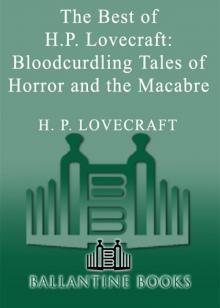 The Best of H.P. Lovecraft
The Best of H.P. Lovecraft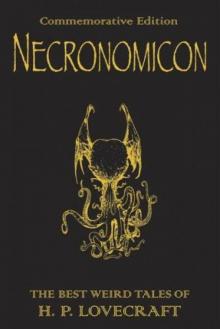 The Definitive H.P. Lovecraft: 67 Tales Of Horror In One Volume
The Definitive H.P. Lovecraft: 67 Tales Of Horror In One Volume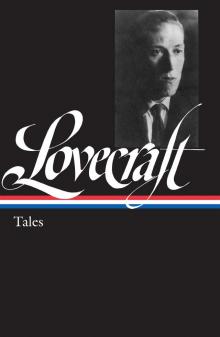 The Complete Works of H.P. Lovecraft
The Complete Works of H.P. Lovecraft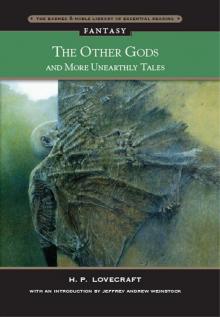 Other Gods and More Unearthly Tales
Other Gods and More Unearthly Tales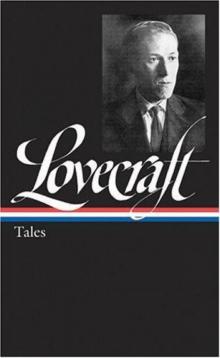 Lovecraft's Fiction Volume I, 1905-1925
Lovecraft's Fiction Volume I, 1905-1925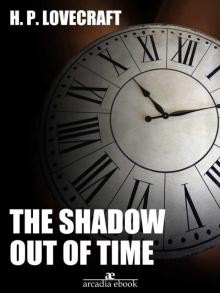 The Shadow Out of Time
The Shadow Out of Time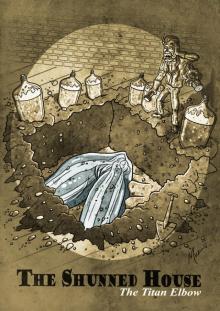 The Shunned House
The Shunned House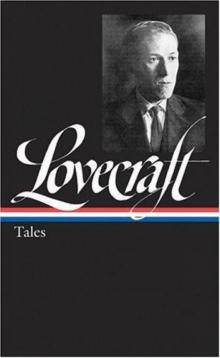 Lovecraft's Fiction Volume II, 1926-1928
Lovecraft's Fiction Volume II, 1926-1928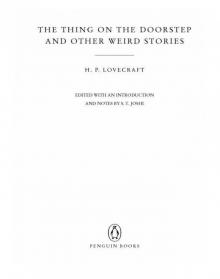 The Thing on the Doorstep and Other Weird Stories
The Thing on the Doorstep and Other Weird Stories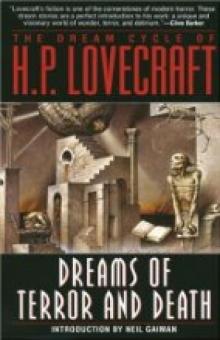 Dream Cycle of H. P. Lovecraft: Dreams of Terror and Death
Dream Cycle of H. P. Lovecraft: Dreams of Terror and Death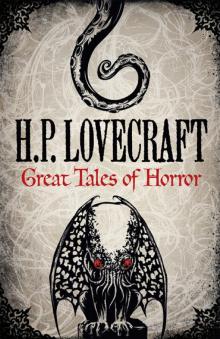 Great Tales of Horror
Great Tales of Horror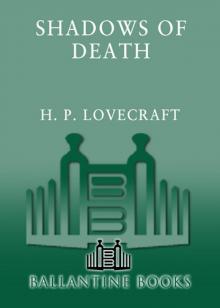 Shadows of Death
Shadows of Death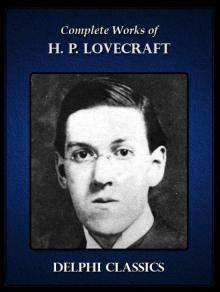 Delphi Complete Works of H. P. Lovecraft (Illustrated)
Delphi Complete Works of H. P. Lovecraft (Illustrated)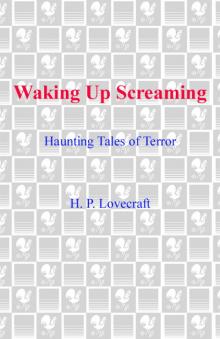 Waking Up Screaming: Haunting Tales of Terror
Waking Up Screaming: Haunting Tales of Terror H.P. Lovecraft Goes to the Movies
H.P. Lovecraft Goes to the Movies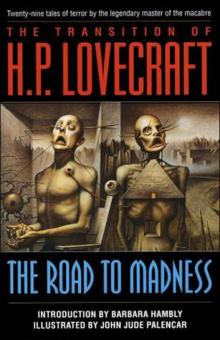 The Road to Madness
The Road to Madness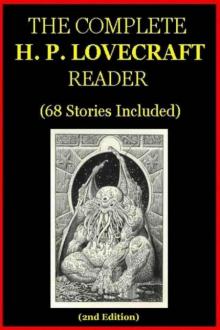 The Complete H.P. Lovecraft Reader (68 Stories)
The Complete H.P. Lovecraft Reader (68 Stories)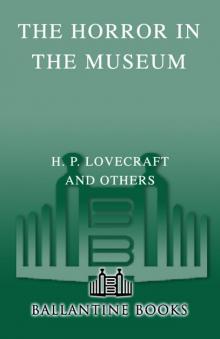 The Horror in the Museum
The Horror in the Museum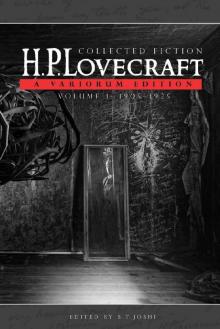 Collected Fiction Volume 1 (1905-1925): A Variorum Edition
Collected Fiction Volume 1 (1905-1925): A Variorum Edition Lovecrafts_Fiction, vol.I_1905-1925
Lovecrafts_Fiction, vol.I_1905-1925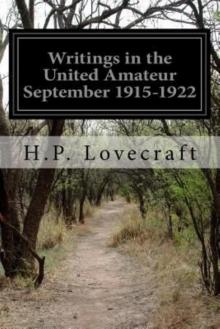 Writings in the United Amateur, 1915-1922
Writings in the United Amateur, 1915-1922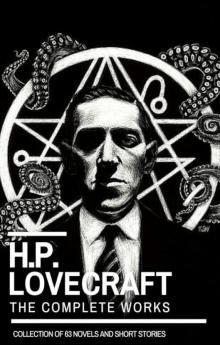 H.P. Lovecraft: The Complete Works
H.P. Lovecraft: The Complete Works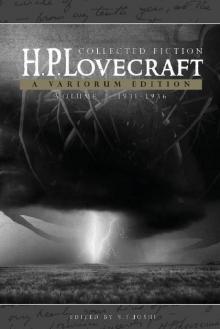 Collected Fiction Volume 3 (1931-1936): A Variorum Edition
Collected Fiction Volume 3 (1931-1936): A Variorum Edition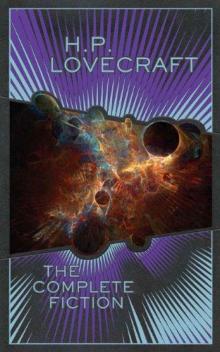 H.P. Lovecraft: The Complete Fiction
H.P. Lovecraft: The Complete Fiction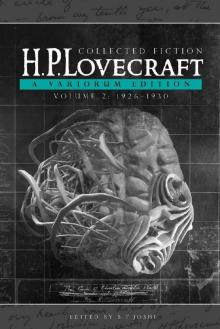 Collected Fiction Volume 2 (1926-1930): A Variorum Edition
Collected Fiction Volume 2 (1926-1930): A Variorum Edition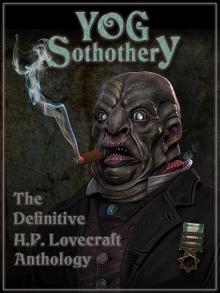 Yog Sothothery - The Definitive H.P. Lovecraft Anthology
Yog Sothothery - The Definitive H.P. Lovecraft Anthology The Complete H.P. Lovecraft Collection (Xist Classics)
The Complete H.P. Lovecraft Collection (Xist Classics)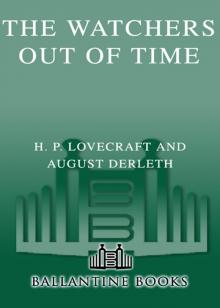 The Watchers Out of Time
The Watchers Out of Time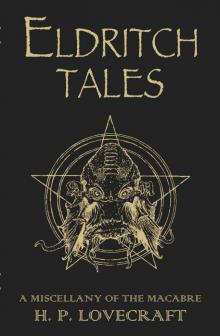 Eldritch Tales
Eldritch Tales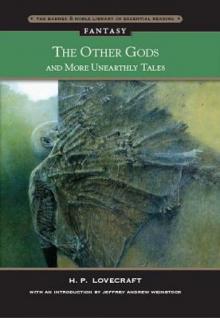 The Other Gods And More Unearthly Tales
The Other Gods And More Unearthly Tales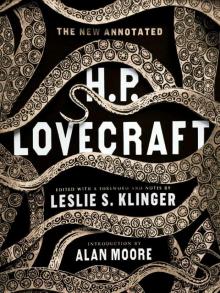 The New Annotated H. P. Lovecraft
The New Annotated H. P. Lovecraft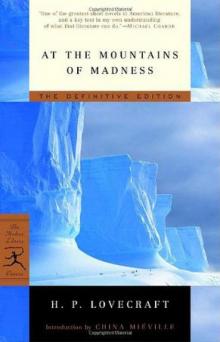 At the mountains of madness
At the mountains of madness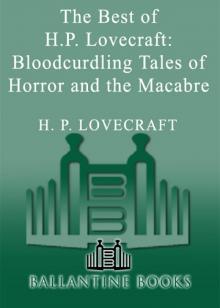 Bloodcurdling Tales of Horror and the Macabre
Bloodcurdling Tales of Horror and the Macabre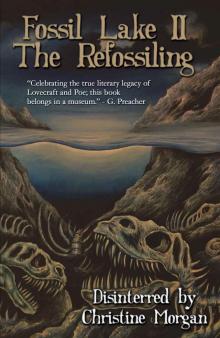 Fossil Lake II: The Refossiling
Fossil Lake II: The Refossiling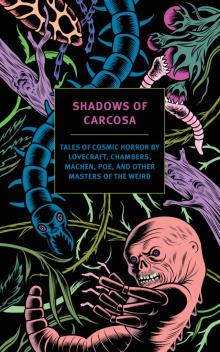 Shadows of Carcosa: Tales of Cosmic Horror by Lovecraft, Chambers, Machen, Poe, and Other Masters of the Weird
Shadows of Carcosa: Tales of Cosmic Horror by Lovecraft, Chambers, Machen, Poe, and Other Masters of the Weird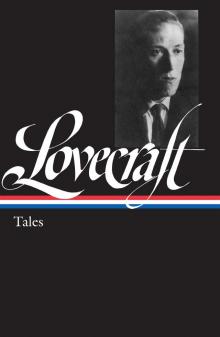 H. P. Lovecraft
H. P. Lovecraft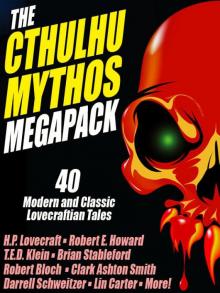 The Cthulhu Mythos Megapack
The Cthulhu Mythos Megapack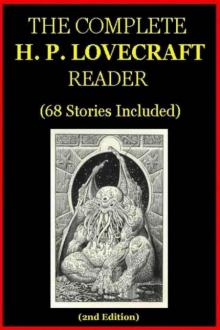 The Complete H. P. Lovecraft Reader (2nd Edition)
The Complete H. P. Lovecraft Reader (2nd Edition)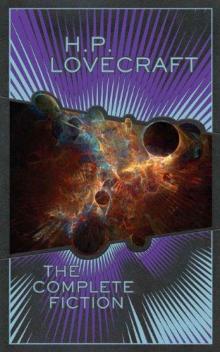 The Complete Fiction
The Complete Fiction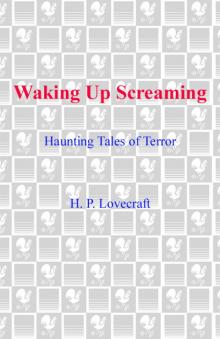 Waking Up Screaming
Waking Up Screaming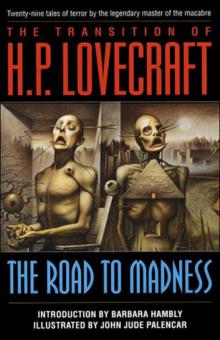 Transition of H. P. Lovecraft
Transition of H. P. Lovecraft![[1935] The Shadow Out of Time Read online](http://i1.bookreadfree.com/i2/04/12/1935_the_shadow_out_of_time_preview.jpg) [1935] The Shadow Out of Time
[1935] The Shadow Out of Time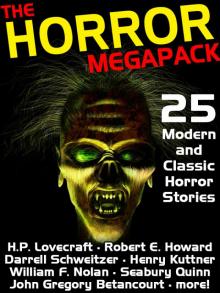 The Horror Megapack
The Horror Megapack